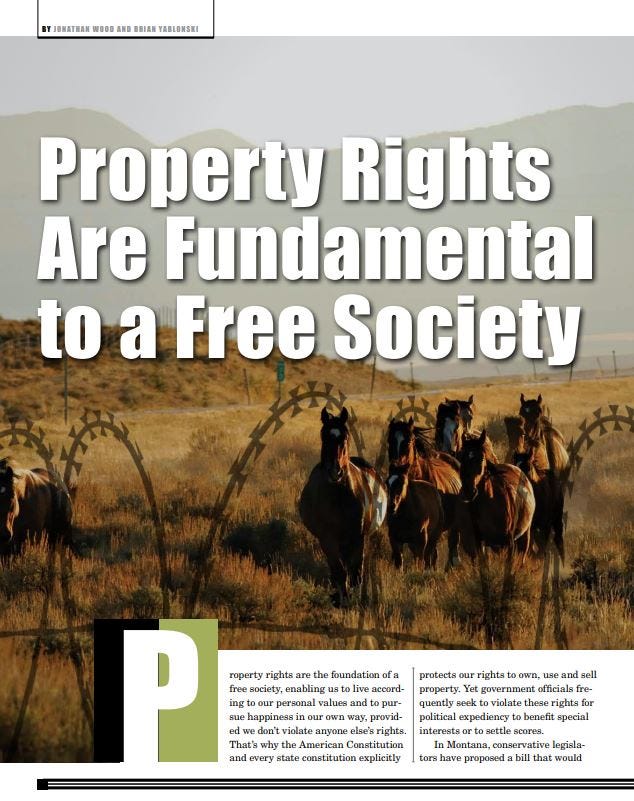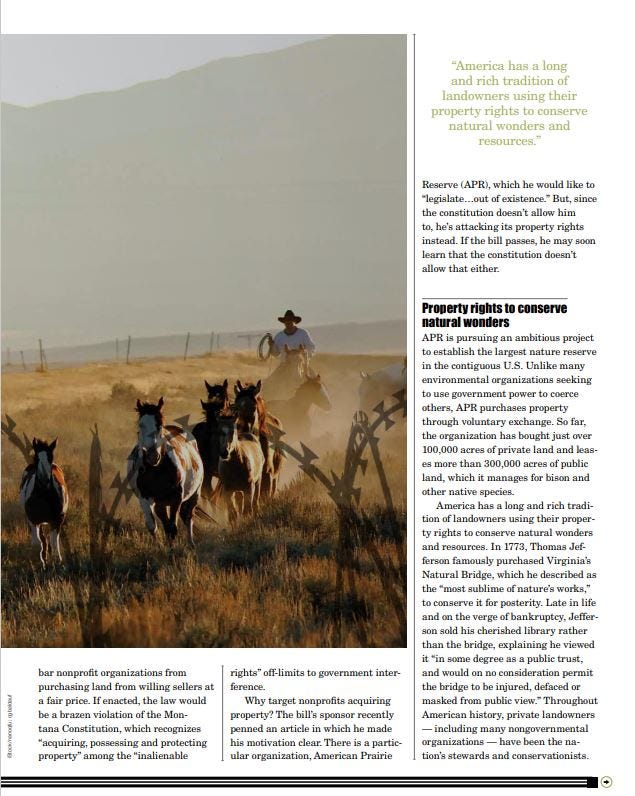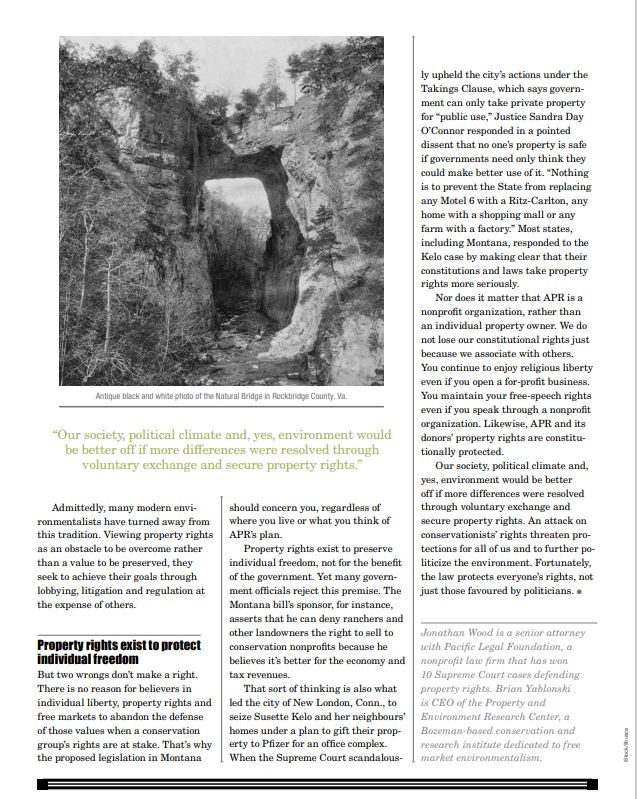Property rights are the foundation of a free society, enabling us to live according to our personal values and to pursue happiness in our own way, provided we don’t violate anyone else’s rights.
By Jonathan Wood And Brian Yablonski
Property rights are the foundation of a free society, enabling us to live according to our personal values and to pursue happiness in our own way, provided we don’t violate anyone else’s rights. That’s why the American Constitution and every state constitution explicitly protects our rights to own, use and sell property. Yet government officials frequently seek to violate these rights for political expediency to benefit special interests or to settle scores. In Montana, conservative legislators have proposed a bill that would bar nonprofit organizations from purchasing land from willing sellers at a fair price. If enacted, the law would be a brazen violation of the Montana Constitution, which recognizes “acquiring, possessing and protecting property” among the “inalienable rights” off-limits to government interference.
Why target nonprofits acquiring property? The bill’s sponsor recently penned an article in which he made his motivation clear. There is a particular organization, American Prairie Reserve (APR), which he would like to “legislate...out of existence.” But, since the constitution doesn’t allow him to, he’s attacking its property rights instead. If the bill passes, he may soon learn that the constitution doesn’t allow that either.
Property rights to conserve natural wonders
“America has a long and rich tradition of landowners using their property rights to conserve natural wonders and resources.”
APR is pursuing an ambitious project to establish the largest nature reserve in the contiguous U.S. Unlike many environmental organizations seeking to use government power to coerce others, APR purchases property through voluntary exchange. So far, the organization has bought just over 100,000 acres of private land and leases more than 300,000 acres of public land, which it manages for bison and other native species.
America has a long and rich tradition of landowners using their property rights to conserve natural wonders and resources. In 1773, Thomas Jefferson famously purchased Virginia’s Natural Bridge, which he described as the “most sublime of nature’s works,” to conserve it for posterity. Late in life and on the verge of bankruptcy, Jefferson sold his cherished library rather than the bridge, explaining he viewed it “in some degree as a public trust, and would on no consideration permit the bridge to be injured, defaced or masked from public view.” Throughout American history, private landowners—including many nongovernmental organizations—have been the nation’s stewards and conservationists.
Admittedly, many modern environmentalists have turned away from this tradition. Viewing property rights as an obstacle to be overcome rather than a value to be preserved, they seek to achieve their goals through lobbying, litigation and regulation at the expense of others.
Property rights exist to protect individual freedom
“Our society, political climate and, yes, environment would be better off if more differences were resolved through voluntary exchange and secure property rights.”
But two wrongs don’t make a right. There is no reason for believers in individual liberty, property rights and free markets to abandon the defense of those values when a conservation group’s rights are at stake. That’s why the proposed legislation in Montana should concern you, regardless of where you live or what you think of APR’s plan.
Property rights exist to preserve individual freedom, not for the benefit of the government. Yet many government officials reject this premise. The Montana bill’s sponsor, for instance, asserts that he can deny ranchers and other landowners the right to sell to conservation nonprofits because he believes it’s better for the economy and tax revenues.
That sort of thinking is also what led the city of New London, Conn., to seize Susette Kelo and her neighbours’ homes under a plan to gift their property to Pfizer for an office complex. When the Supreme Court scandalously upheld the city’s actions under the Takings Clause, which says government can only take private property for “public use,” Justice Sandra Day O’Connor responded in a pointed dissent that no one’s property is safe if governments need only think they could make better use of it. “Nothing is to prevent the State from replacing any Motel 6 with a Ritz-Carlton, any home with a shopping mall or any farm with a factory.” Most states, including Montana, responded to the Kelo case by making clear that their constitutions and laws take property rights more seriously.
Nor does it matter that APR is a nonprofit organization, rather than an individual property owner. We do not lose our constitutional rights just because we associate with others. You continue to enjoy religious liberty even if you open a for-profit business. You maintain your free-speech rights even if you speak through a nonprofit organization. Likewise, APR and its donors’ property rights are constitutionally protected.
Our society, political climate and, yes, environment would be better off if more differences were resolved through voluntary exchange and secure property rights. An attack on conservationists’ rights threaten protections for all of us and to further politicize the environment. Fortunately, the law protects everyone’s rights, not just those favoured by politicians.
Jonathan Wood is a senior attorney with Pacific Legal Foundation, a nonprofit law firm that has won 10 Supreme Court cases defending property rights. Brian Yablonski is CEO of the Property and Environment Research Center, a Bozeman-based conservation and research institute dedicated to free market environmentalism.
Published in PIPELINE OBSERVER Winter 2022
Do you like this page?




